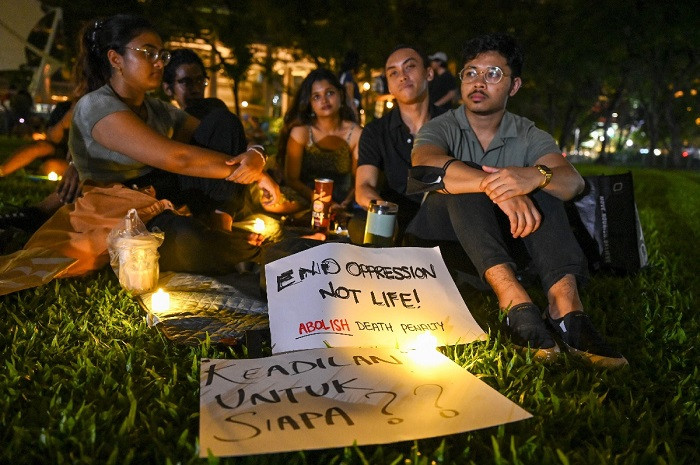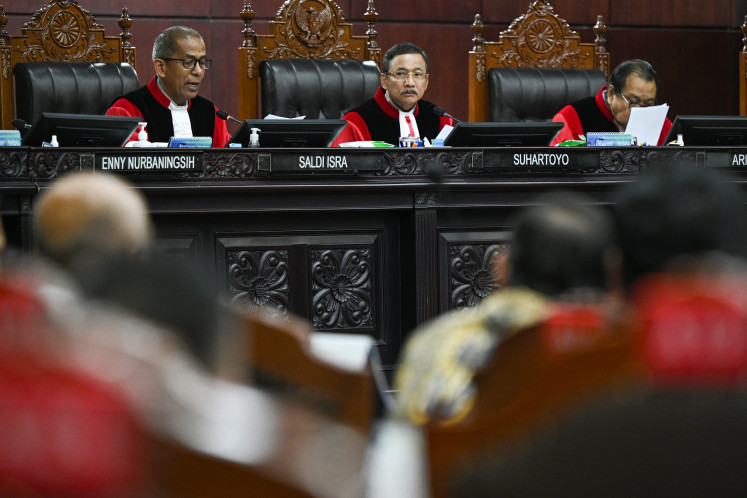Popular Reads
Top Results
Can't find what you're looking for?
View all search resultsPopular Reads
Top Results
Can't find what you're looking for?
View all search resultsAbolishing death penalty is a long game to play
It is essential to create a critical mass, a larger audience of new generation Singaporeans who are ready and equipped to question the death penalty.
Change text size
Gift Premium Articles
to Anyone
W
e all know it is not easy to be a civil society activist in Singapore. It is even harder if you campaign against the death penalty with relentless determination and an overarching commitment to justice, together with the hope that things might one day change.
This is the case of Kokila Annamalai, an abolitionist campaigner who helped me better understand possible avenues to changing the status quo in Singapore.
The execution of Malaysian national Nagaenthran Dharmalingam in April was a turning point not only for activists like Kokila but for a multitude of citizens that for the first time had the courage to protest against the system.
Unfortunately, nothing has changed since the execution. Earlier this month, two other death row inmates, Nazeri Bin Lajim and Abdul Rahim Bin Shapiee, were hanged.
People outside of Singapore know about the draconian law, but many do not understand the complexities of a legal system that the Transformative Justice Collective (TJC) rightly says is “stacked” against the accused.
Kokila, a cofounder of the TJC, made me aware that the death penalty should not be seen in isolation but rather as part of a wider legal framework limiting freedom in Singapore.
For example, during interrogation with police officials, you cannot avail to any legal counsel. It also means that the statutory privilege against self-incrimination, or the right to stay silent in lay terms, exists only on paper.
It is a system where even the inmate’s lawyers risk to pay a very high price because the High Court and the Court of Appeal in Singapore can order costs to the lawyers for what might hold as “frivolous, vexatious or an abuse of process”.
Such orders really happen. Just ask M. Ravi, one of the boldest legal defendants in the death penalty and now at risk of being stricken out of the bar. Or ask Charles Yeo, another lawyer and former opposition politician, now seeking political asylum in the United Kingdom.
Moreover, there is the famous Certificate of Substantive Assistance where a death sentence can hope for an alternative sentence but comes with the risk of having your statements further used against you. In short, you talk to save your life but you risk further self-incrimination.
This is the legal context in which activists like Kokila have to deal with, but even more frightening is the broader context of which people are afraid to speak up about in order to challenge the death penalty and the apparatus underpinning it.
The solution, according to Kokila, is to keep the pressure up and create the conditions for the people of Singapore to gain the self-confidence and firmness to tackle the issue of the death penalty and other abuses directly and upfront.
It is going to take time, but Kokila is optimistic that the tide is turning and more and more people are starting to doubt the government’s stubbornness. It is essential to create a critical mass, a larger audience of new generation Singaporeans who are prepared and equipped to question the system.
The TJC is using storytelling to counter this official narrative, in addition to giving voice and support to the family members of those now awaiting execution.
It is a long game and when pressed, Kokila rejects any timeframe by which, for example, a moratorium on the death penalty could be invoked together with a high-level review of capital punishment. Yet a moratorium should be the goal and something to campaign about.
Only if more people will start demanding transparency and predictability, where a lawyer can simply do their job without fear of retribution in the form of contempt, court threats or big monetary fines, the People’s Action Party (PAP) might start making reconsiderations.
I was cautioned by Kokila not to be overoptimistic by the 4th generation leaders in Singapore because certain positions are so ingrained in the party members‘ mindset that it is really difficult for them to change course and admit that their policies can change.
Changing from the top is also difficult because it would undermine the PAP’s own narrative and the official line about security, safety and deterrence.
Recently the TJC, in one of the meet-the-people sessions where the MPs talk to their constituencies about problems and issues they faced, Education Minister Chan Chun Sing spoke about how much he understands the death penalty.
He simply referred to the concerned government agency because that’s an official policy of the government.
We certainly need more of BBC’s HardTalk interviews with senior ministers of Singapore, but citizens of Singapore cannot do this; they can’t even organize a storytelling in public because they would get into trouble with the unlawful assembly legislation.
Yet the mood is changing and personal experiences do matter according to a report by Black Dot Research, and this storytelling is paramount: the closer you get to the issue, the more you familiarize with the unjust system and the sufferance caused by it and the more likely you will start questioning the “blank check” given to the PAP government to justify the system.
There is no international donor or agency who can financially support the battles of the TJC and others. Massive peaceful protests against the system might be unimaginable now but many youths might end up being forced to think otherwise.
What is possible at the moment is to focus on doing something; working with the very limited operating space that an activist like Kokila can afford to use. There is no other way but slowly more younger generations in Singapore will raise their hands and ask uncomfortable questions to the PAP leaders.
These are not going to be acts of subversions but rather mature gestures about a policy that is changing.
The PAP government had better recognize that policies which are presumably infallible can be wrong, that the society as a whole deserves better and their usual narrative will be met by more and more pushback.
That’s why the death penalty issue should be raised during the ongoing Forward Singapore, the citizens’ consultations being led by Lawrence Wong, the new deputy prime minister and very probably the ruling party’s candidate for prime minister in the next elections.
Wong needs to muster the courage to discuss openly and transparently about the death penalty and the real possibility that his country needs a new narrative.
***
The writer comments on social inclusion, youth development, regional integration and the SDGs in the context of Asia Pacific.










